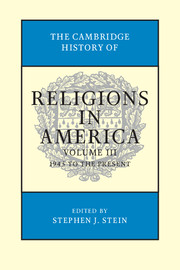Book contents
- Frontmatter
- SECTION I THE POSTWAR RELIGIOUS WORLD, 1945 AND FOLLOWING
- 1 Dangerous and Promising Times: American Religion in the Postwar Years
- 2 Public Religion in Canada from Mackenzie King to Trudeau: Entering the Age of Pluralism, 1945–1982
- 3 Religion in Mexico, 1945–2010
- 4 American Judaism in the Postwar Period
- 5 Suburbanization and Religion
- 6 The Postwar Religious World, 1945 and Following: The Case of Asian Religions in the United States
- SECTION II CONTROVERSIAL ISSUES IN TRANSITIONAL TIMES
- SECTION III THE WORLD’s RELIGIONS IN AMERICA
- SECTION IV RELIGIOUS AND CULTURAL CONFLICT IN AMERICA
- SECTION V NEW AND CONTINUING RELIGIOUS REALITIES IN AMERICA
- SECTION VI CONCLUDING ESSAYS
- Index
- References
1 - Dangerous and Promising Times: American Religion in the Postwar Years
from SECTION I - THE POSTWAR RELIGIOUS WORLD, 1945 AND FOLLOWING
Published online by Cambridge University Press: 28 July 2012
- Frontmatter
- SECTION I THE POSTWAR RELIGIOUS WORLD, 1945 AND FOLLOWING
- 1 Dangerous and Promising Times: American Religion in the Postwar Years
- 2 Public Religion in Canada from Mackenzie King to Trudeau: Entering the Age of Pluralism, 1945–1982
- 3 Religion in Mexico, 1945–2010
- 4 American Judaism in the Postwar Period
- 5 Suburbanization and Religion
- 6 The Postwar Religious World, 1945 and Following: The Case of Asian Religions in the United States
- SECTION II CONTROVERSIAL ISSUES IN TRANSITIONAL TIMES
- SECTION III THE WORLD’s RELIGIONS IN AMERICA
- SECTION IV RELIGIOUS AND CULTURAL CONFLICT IN AMERICA
- SECTION V NEW AND CONTINUING RELIGIOUS REALITIES IN AMERICA
- SECTION VI CONCLUDING ESSAYS
- Index
- References
Summary
“We are living in a uniquely dangerous and promising time.” That brief statement, included in a resolution approved by the Federal Council of Churches in 1945, captured the sentiment of many Americans at the end of the Second World War. While much of the world was exhausted from years of warfare unprecedented in its global impact, the United States seemed poised to assume international leadership as never before. Yet the devastation of the war and the realities of a nuclear era created great uncertainty amid the celebrations of victory over Fascism and the hope of a worldwide spiritual and cultural renewal. The beginning of the atomic age, frighteningly evident in the bombings of Hiroshima and Nagasaki, raised the possibility of mass annihilation, a new type of arms race, and an ongoing Cold War. For many American religionists, these dangers demanded that communities of faith work together to deepen personal and corporate spirituality, developing renewed ecumenical relationships beyond old sectarian divisions. In the two decades after the war ended, Christianity in America experienced phenomenal organizational and numerical success. While internal divisions over doctrine, biblical authority, and church/state issues remained, many religious leaders urged churches and denominations to unite in response to challenges created by the rapid expansion of pluralism, secularism, and materialism throughout the society.
THE WORLD WAR – A RIGHTEOUS CAUSE AND A MORAL DILEMMA
The war itself raised innumerable ethical and moral issues for American religious communions. During the 1930s, as Adolf Hitler and National Socialism gained political power in Germany, American Christians offered varying assessments. Some looked rather positively on Hitler’s early “moral crusades.” In 1934 when the Fifth Baptist World Congress met in Berlin, certain Baptists from the United States returned home with praise for the “new” Germany. The Boston pastor John W. Bradbury observed, “It was a great relief to be in a country where salacious sex literature cannot be sold; where putrid motion pictures and gangster films cannot be shown. The new Germany has burned great masses of corrupting books and magazines along with its bonfires of Jewish and communistic libraries.”
- Type
- Chapter
- Information
- The Cambridge History of Religions in America , pp. 1 - 27Publisher: Cambridge University PressPrint publication year: 2009

